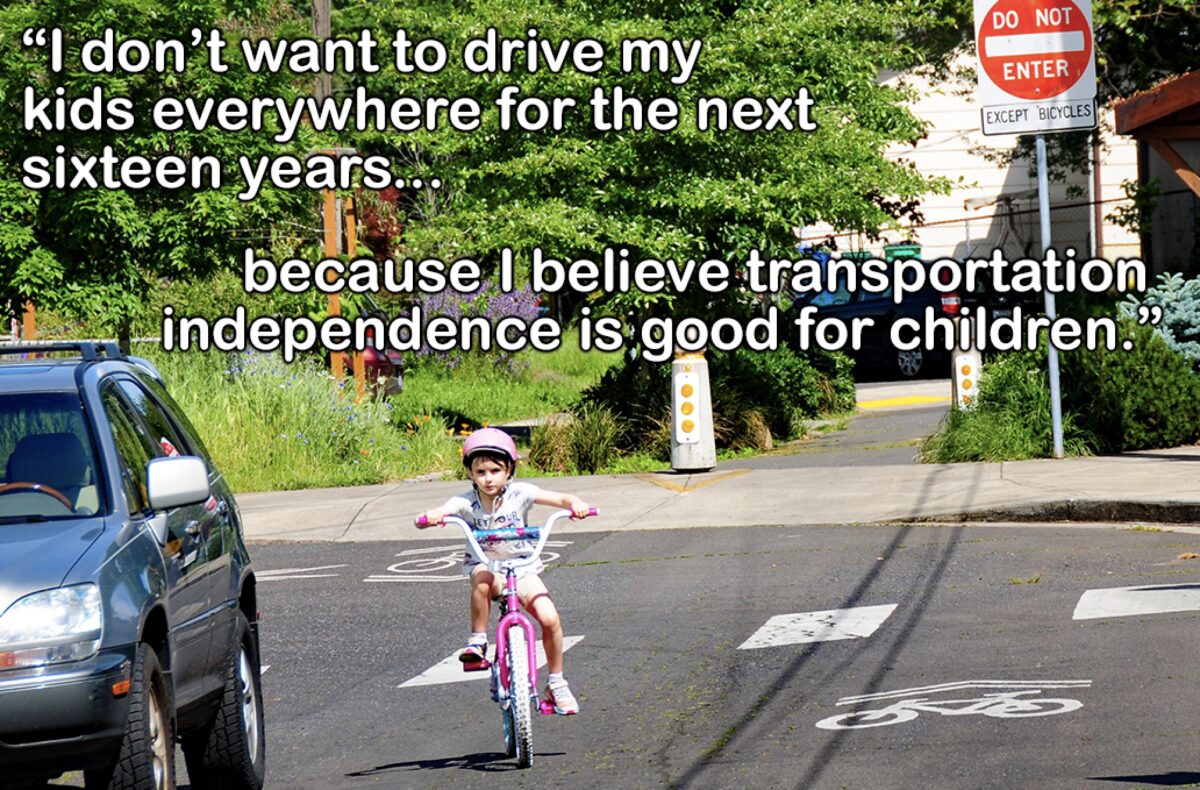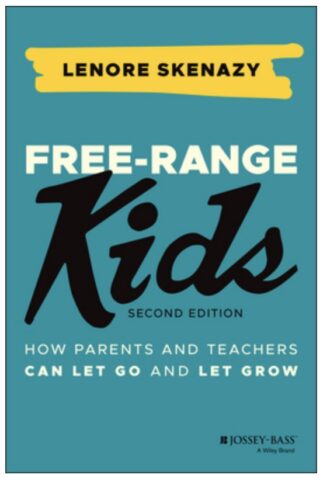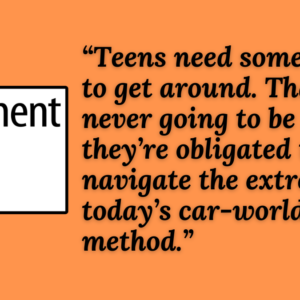
Are you a bad parent if you let your kid use public transit on their own?
Well, if you go by what other people think, you might not just be a bad parent: you could be “America’s Worst Mom.” Just ask Lenore Skenazy, who earned that title for letting her nine-year-old son (who had been begging for such an opportunity) navigate his way home by subway and bus, on his own, in New York City.
Skenazy details the non-incident (her son got home just fine, totally proud and happy) and its aftermath in her newly updated book, Free Range Kids: How Parents and Teachers Can Let Go and Let Grow. As Skenazy recounts, she defended her now infamous parenting choice in a newspaper column, (note to self: it’s dangerous to write about parenting in front of other people), and was then invited on a multitude of news, TV, and radio programs, where she was quickly condemned by “experts,” hosts, and parents nationwide, and earned the unforgettable label of “America’s Worst Mom”.
A bit further back in time, say forty years ago, or fifty, or even one-hundred years back, such an action wouldn’t even have been a topic of conversation. Back then, city kids navigated city streets on their own all the time. They played on sidewalks, walked to school and stores, ran errands, or otherwise walked, biked or bused around. Some kids even had their own jobs, like newspaper delivery. The parents of those kids–and their newspaper employers–actually expected kids to ride their bikes in the dark of pre-dawn mornings, pick up a load of papers, and successfully deliver them around town to paying customers, on their own.
Advertisement
What changed? You’d think the answer was gangs, drugs, violence, abductions, pedophiles, serial killers, and the like; but as Skenazy points out, those sorts of things are no more prevalent today than in those bygone days when kids could ride a bicycle around the city without attracting the shocked attention of concerned citizens.
So, what did Skenazy do, in the face of a public skewering of her parenting choice to give her kid some transportation independence? Did she give up writing, leave New York City, throw away her cell phone, cut off all internet connections and flee to a remote cabin in the woods, where she could raise her children in the peace of obscurity? Nope. Quite the opposite. She bravely stood her ground, stubborningly dug in her heels, wrote a book, hosted a TV show, gave lectures around the world, became president of a non-profit, and started a movement to promote reasonable childhood independence, now known as Free Range Kids.
It’s a good thing too. Because there are a lot of us out here who want to do the sort of thing she did, quite preferably without all the hullabaloo. We’d very much like to let our kids ride the MAX, or the public bus, or ride a bike to school, or walk to the library, or play at the park on their own…but even if we have decided our kid is old enough, mature enough, and the local conditions are safe enough, we’re pretty sure we’ll be roundly condemned if we give our kids that sort of freedom and responsibility. At least, thanks to Skenazy, we can’t be America’s worst Mom or Dad, since she already has that title.
The Free Range movement Skenazy started encompasses a whole lot more than childhood transportation independence–and I sincerely recommend you check out her book, her blog, and her non-profit for a full view of her advocacy: you’ll be inspired, or so I hope, because I’d sure like more mom-friends like her around. These resources are a great place to find encouragement, bust fear-mongering myths, and connect with a community of like-minded free-range parents. They’re also a great place to begin, if you aren’t quite sure if child transportation independence is right for your family, or something you could handle without implanting a micro-chip in your kid, or surreptitiously following them around until they turn twenty.
It’s important to me personally, because as I wrote recently, I don’t want to drive my kids everywhere for the next sixteen years. That’s not just because I’m lazy or anti-car, but because I believe transportation independence is good for children, an important part of their development, confidence, maturity, and connection to their community. It’s also really fun, part of the adventure of growing up and learning one’s way in the world.
Thus, I daresay, it won’t make me a bad parent at all, or you either. So buck up, be brave, and follow your heart…and I hope that will mean letting your kids do the same, regardless of what others have to say about it.
— Shannon Johnson, shannon4bikeportland@gmail.com
— Get our headlines delivered to your inbox.
— Support this independent community media outlet with a one-time contribution or monthly subscription.








Thanks for reading.
BikePortland has served this community with independent community journalism since 2005. We rely on subscriptions from readers like you to survive. Your financial support is vital in keeping this valuable resource alive and well.
Please subscribe today to strengthen and expand our work.
I can’t praise this mother enough. There’s no reason why children need to be sheltered more now than 50 years ago. The ‘crime wave’ is entirely a media phenomenon. Crime sells. Portland has a damn good transportation system and excellent bike infrastructure compared to most of the rest of this country, so why shouldn’t children be able to take advantage of it too?
While crime is WAY down in Portland and everywhere else compared to 50 years ago, and violent crime is even MORE WAY DOWN compared to then…if we don’t create fear and panic, then how in the hell are we going to sell the massed on the idea of taking monies from all parts of the city and putting it all on an expanded police budget, hmmm?
Why are historic low-points the baseline against which we should judge what’s tolerable? We’ve demonstrated that low crime rates are possible (and highly desirable!), so that’s what we should be striving for. Something has gone seriously off the rails, and the “it’s covid” excuse is not really working for me anymore.
Yeah, the weekly sounds of gunfire. Yep, I’m just imagining it.
The reckless driving of people on the street. Yep, I just imagined that car almost hitting me when I tried to cross the street.
My neighbors who had house and vehicles broken into 3 times within a year and moved. Yeah, I’m sure they imagined those people entering their house through their skylights.
Yep, just a media phenomenon as you say. Just a vivid part of our collective imaginations.
I moved to Portland in 1951 at the start of second grade in north Portland at Peninsula grade school. I started riding the bus (St Johns) downtown to go swimming at the YMCA on SW 5th. with a friend from school in February 1952. I was riding my bike to the zoo (Washington park) in the summer of 1952 via Greely and the roadway bridge. In 1953 I was riding to Milwaukee via Williams, Union (MLK) and SE 17th. When I got to high school, I rode to Benson and back when the weather permitted. I was 10 years old when i rode from my home (close to Greely and Lombard ) to Sauvis island and back via St.Johns bridge. I had very few problems since I stayed on the street and not on the sidewalks. I also wore bright clothing.
Totally approve. Fearles personal mobility coordinator on pink vehicle of transcendance.
I first heard the term “free-range kid” at a statewide bike/walk conference in Winston-Salem NC in 2019, from a planner from New Hampshire who got the term from “free-range chickens” in the supermarket. I dare say others have independently “invented” the term in other times. When this planner presented us with the term he asked how many of us also grew up as free-range kids – it was over half the folks in the room, myself included, including nearly all the bike planners.
I find it interesting that the mom gets blamed but not the dad.
I grew up in a small city of 50,000 in North Dakota, learned to bike at the age of five (with no help from my bike racing brothers I might add) and was free-roaming citywide by the age of 9. I also learned to use our public bus system by the age of 7, after two years of training by my older sisters (my mom went back to work as soon as I could fix my own breakfast, around the age of five.) As long as we got home in time for supper, my highly-negligent academic parents didn’t really care where any of their 5 kids were. No doubt my early independence contributed to my never learning to drive (nor being inclined to do so) and a lifetime of being a professional trouble-maker.
Still free-range, now in North Carolina.
I can relate to this. Once I started getting around town on my bike (little later than you did), I stopped needing to ask my folks to take me places. I stopped needing to wait on the school bus (I would sometimes wait for it at my stop and race it to school and often beat it). When driving age came around in high school, many of my peers were so excited for new independence and I was left wondering “New? …I’ve been doing this for years already. And I don’t have all the bills that come with”.
Couple decades later I’ve still never driven and have yet to want to.
Crime isn’t the issue here. It’s huge, powerful vehicles vs. tiny children.
There are a lot of anecdotes here from “olden times” when there were far less people, cars, and distractions on the roads. The streets of 2021 bear little resemblance to those of 1951, 1981, or even 2011. Todays cars are faster than ever, bigger than ever, and driven (barely) by the most-distracted drivers, ever. When it comes to sharing the road, drivers barely see adult cyclists, let alone little kids. It sucks.
I’m not sure what the future holds for vulnerable road users in this country, but it doesn’t seem too bright for children walking or biking on roads that are overrun by overpowered and oversized vehicles.
And yet… Pedestrian deaths have been falling for decades, despite population growth. It is far safer now than when I was a kid.
https://www.iihs.org/topics/fatality-statistics/detail/pedestrians
What’s scary about that link is it shows that we’re right on track to the previous 1979 peak of ~8100 deaths. We hit an all time low of 4100 in 2009, and then it’s just been rapidly increasing year over year. They don’t list 2020, but “The Governors Highway Safety Association (GHSA), an organization that represents highway safety agencies, estimated there were 6,721 pedestrian deaths in 2020. GHSA said the pedestrian fatality rate rose 21% from 2019 — making it the largest ever annual increase.”
“ Pedestrian deaths have risen by 46% over the past decade, while all other traffic deaths increased by only 5%.”
“ the National Safety Council (NSC), a nonprofit focused on promoting safety in the United States, said despite a 13% drop in miles driven in 2020, the estimated rate of death on the roads last year spiked 24% over the previous 12-month period.”
This is all related to larger, faster vehicles and smart phone/tech distractions. So, yeah, that’s too bad for the adults who’ve enjoyed the safer years and decline in pedestrian/vulnerable road user deaths, but it’s really tragic for the kids who will only know this dangerous world.
Can’t hit people that aren’t there
It’s all fun and games proving your free range ideals until your child is assaulted or taken.
Here is the difference since the wonder years. Smart phones. Voyeurism is now a factor is assaulting or taking kids.
Prove your point. They can’t get all the kids, right?
The child abduction narrative has been used to scare people for a long time now. It happens, but it’s quite rare. Your kid is much more likely to get hit by a car than be abducted.
“On average, fewer than 350 people under the age of 21 have been abducted by strangers in the United States per year since 2010, the FBI says. … In cases where children are abducted, it is far more common for a non-custodial parent to be the kidnapper: This was reported 2,359 times in 2017, the FBI data showed.”
https://www.reuters.com/article/us-wisconsin-missinggirl-data/kidnapped-children-make-headlines-but-abduction-is-rare-in-u-s-idUSKCN1P52BJ
You left the assaulted part out
You’ve heard of a lot of kids being assaulted on the street by strangers??? Wouldn’t that be a lot bigger news if it happened with much regularity?
I would guess kids are more likely to be assaulted in their own home than out in public.
I struggle with articles like this that talk about “kids”. Unless you are speaking specifically about a particular age the information you present is meaningless. What is appropriate for a 12 year old is likely not for a 6-year old. And even with that, a parent should understand what their child is capable of before allowing them to venture on their own.
That being said, kids are capable of many more things than parents are “comfortable” allowing them to do. Also, “stranger danger” is still a mantra that kids hear from a young age and I feel scares kids into not wanting more independence. My feeling is that in situation outside the home where you need help, it is a stranger that will be the one to help you so fear of strangers, by both kids and adults, limits their independence.
Framing this in terms of how a free-range kid benefits the parent (not having to drive them everywhere) misses the much more important outcome, which is how it benefits the child. The biggest value from encouraging independence in kids is it provides them the opportunity to develop the skills needed to asses risk for themselves. When I hear “better safe than sorry” I cringe because it discounts the benefits of taking an age-appropriate risk. Likely, many parents lack those same skills so err on the side of caution, which only perpetuates the problem.
How things were in the “old days” is not necessarily the appropriate yard stick either because benign-neglect is not the best parenting strategy. If you know your child you can challenge them, at any age, in ways that will build their confidence and ability to safely navigate the world on their own…as a kid and an adult.
As an educator who often works with parents, your observation about “better safe than sorry” is spot on. So often the calculus of risk—a combination or consequence vis a vis probability of harm—is wildly miscalculated. I find folks focus on the worst case scenarios even if that harmful event (almost) never occurs, ie overly weighting the probability side do the equation. It’s easy to do, I believe, due to the nature of our media ecosystem that focuses on extreme events and brings them to the forefront.
I walked to kindergarten and grammar school by myself, in Manhattan, in the 1970s – when the city was seeing over 1500 murders a year and had ended overnight subway patrols just to be able to put enough police officers on the streets to combat daytime crime.
Later, as a kid in semi-rural Massachusetts, my summertime late 1970s and early 1980s were spent on a bike. I rode a bare minimum of 5 miles a day and usually more like 30 or 40. In a semi-rural town with no public transportation and parents who worked full-time, it was just How We Got Around.
My kids have been biking on the back of my cargo bike since they were toddlers and next to me on their own bikes since they were capable. We started allowing solo trips to soccer practice at 11 and now my oldest at 14 can get himself most places he wants to go. He doesn’t ride public transit alone, but that’s next on the list. As some posters have mentioned cars are bigger now and I live in quiet fear of a giant pick-up truck with a ridiculous square grill plowing into my kid. I live with the fear because it’s important for my kid to learn these skills and not alter his life for stupid truck owners.
Colorado has a free range law. Does Oregon?